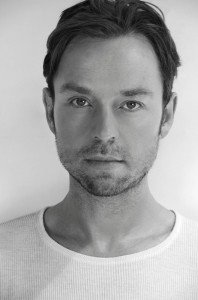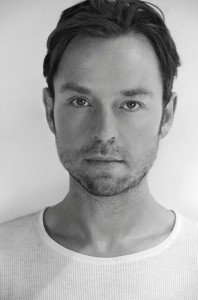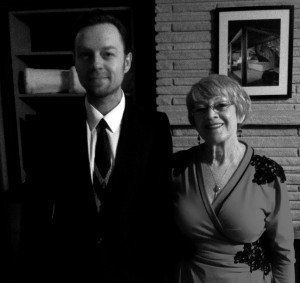Darren Hayes: Why marriage is important to me
By Nick Levine

There’s a noticeable deficit in my heart today. I’m sat on a patio at a local coffee chain here in Los Angeles, my dog Wally dutifully by my side and the full carnival of life going on around me as it always does in every city in every world.
The melancholy feeling, that invisible sigh, is not complex. I put my Mum on a plane back to Australia yesterday. She had been here visiting my husband and me, spending Christmas and New Year with us. It was a wonderful trip but ever the dramatist, I’ve awoken to a world where every turn reminds me of her and all the moments we shared for the past three weeks. I suspect it’s a common feeling for anyone who has lived abroad. I’m 7,000 miles away from my nearest relative. It’s a bittersweet feeling. Yesterday this patio was a magical stage for conversation: a fire pit outside, hot chocolates brewing indoors and all around us the buzz of connection. Behind me is the spot we stood drinking our coffee, planning our trip to the Getty Museum and holding hands. Today it’s just a grimy patio with strangers, my dog and me.
Yet I feel so lucky to be able to sit on this grimy patio and share my story with you.
My mother first met my husband at Heathrow Airport in July 2005. She had flown over with my sister, my brother-in-law and their two children – my niece and nephew – to attend our wedding.
Back then, there was no law in place that would allow Richard and me to marry legally, but we didn’t care. We’d met a year prior, fell madly in love and there was no question we were going to spend the rest of our lives together. I proposed, he said yes and we planned an extravagant wedding. It was the happiest day of my life.
My family were outrageously embracing of Richard. Bear in mind they’d never met this stranger at the airport who was about to be become family. But they’d never seen or heard me so happy and it was as much a celebration for them as it was for me.
Yes, it was fabulous wedding (I was a rich pop star, we had a fancy reception and we spoiled our guests) but that wasn’t the point. The powerful and transformative aspect of our marriage was the symbolism it contained.
We were living in Notting Hill in London at the time, our newly purchased house a construction zone of renovations. Guests were invited to turn up at 10am to what was essentially a hard-hat area. They included my family from Australia, Richard’s from Nottingham, and various London friends, and there were probably 30 people in total. They knew it was a ‘wedding’ – but had no idea what was about to unfold. They were told to dress nicely, bring a change of clothes and something fabulous to wear for an evening event and an overnight stay somewhere undisclosed.
When guests arrived, Richard and I handed them envelopes – individual hand-written cards for each guest; essentially a script to be read out in order.
As we stood in a circle, all holding hands, I will never forget the feeling of unconditional love and acceptance I felt as our guests married us. As each card was read out, the mood would switch from gut-busting hilarity to heart-wrenching tears of happiness depending on the anecdote on the card. Each envelope contained an aspect of the story of our lives, our families and how our love had unfolded. By the time the guests realised what was happening, it was overwhelming. Our nearest and dearest pronounced us married. We had come together, as a community and family to give blessing, hope and encouragement to this new union.
I remember staring out at the faces of love. I held my mother’s hand, she mine, mine held Richard’s and so on all around the circle. Opposite me my baby niece and nephew witnessed grown adults crying tears of joy and to this day they describe it as normal. They’ve grown up in a world where boys marry boys, boys marry girls and girls marry girls. To them, it’s all normal.
A year later, the Civil Union law came into play in the UK. Richard and I embraced the privilege by signing papers at a registry office in our local town hall in front of two witnesses. It was at this time that I decided to announce to the world I’d married Richard and was indeed proudly gay.
We already felt married, but we felt so grateful for the tireless work and perseverance of generations of activists who had fought for recognition that we wanted to be a part of this significant leap forward in human rights. Twelve months after we were spiritually married, we became Civil Partners in the UK – a legal act that afforded me essentially all the rights of a marriage including residency and social benefits.
The reaction to my coming out was extraordinarily positive. On another occasion I’ll share the gory details of my journey to accepting my sexuality, but suffice it to say it wasn’t easy. I struggled for many years with depression and even thoughts of suicide, all stemming from the shame and the guilt I felt about my sexuality. To have found great love, big love – love huge enough to feel I could stand on the shoulders of it and scream it out proudly to the entire world – was a massive help. But so was the social and legal protection of marriage.
As I explained, we did not get married for a piece of paper. We did it for emotional and symbolic reasons. To us, having a Civil Partnership was almost a technicality. We took advantage of this right thinking it was a mere formality, but we were not prepared for the incredible feeling of legitimacy and social standing that protection under the law afforded us. Walking out of the town hall that day, I knew from that moment on, no matter what anyone thought about me personally, under the law I was more equal than I’d ever felt my entire life.
Becoming a UK citizen, receiving my passport, proudly walking through those gates at Heathrow as Richard’s legitimate partner. These were significant leaps forward in the way I saw myself within my society.
To put things into perspective, a huge part of the shame and dread I felt about my sexuality was rooted in how I thought society viewed me. I had a turbulent childhood growing up in a family where my mother and siblings dealt with the fear and harsh reality of a violent alcoholic father. My childhood, though filled with love from my mother, was anything but idyllic. I used music and fantasy to escape who I was. I also dreamed of growing up one day marrying and having children and creating a happier family than the one I’d been born in to.
Of course I knew I was gay subconsciously. But consciously I didn’t think my instincts were something I could share with the world. I didn’t know a single gay person and those I did see were extreme and grossly exaggerated forms of camp for entertainment. I didn’t see a role model I could relate to. Growing up in the ’70s and ’80s gay people were polarized by popular culture. We were either clowns dragged out for entertainment (Mr Humphries in Are You Being Served) or ostracised for being the harbingers of doom (Rock Hudson and Liberace dying from a mysterious gay plague).
I had crushes on boys at school but there was no happy ever after story and I learned quickly to hide my true self away so expertly that even I forgot who I really was. I never forgot what it felt like to be called a faggot, however. The sting of being bullied and the messages I received from my peers was clear: there was something wrong with me. So I buried my feelings until I didn’t even admit them to myself anymore.
That worked fine for the first half of my adult life until, thankfully, a career in the entertainment industry brought me face to face with the reality that gay people, like all people, come in a variety of forms. When I saw there were men just like me who were out and proud, my definition of who I was began to change.
It wasn’t easy at all. I have a family history of mental illness and I spiralled quite badly into periods of deep depression before I came out. There were moments where I couldn’t imagine a happy future and I certainly couldn’t imagine living in a world where I would feel accepted.
Fast forward to 2014. I’m writing to you from the United States – where my husband, yes that’s right husband, Richard and I are were legally married in the State of California and were granted permanent residency on the basis of our union.
It wasn’t always easy. And it still isn’t. Today, organisations like It Gets Better and The Trevor Project exist because, statistically, frighteningly, LGB kids are four times more likely to take their own lives than their heterosexual peers.
Why? Social acceptance, fear of persecution and a general feeling of alienation are key. Some of these kids come from home environments and social circles where culture and religion still perpetuate the shocking myth that sexuality is a choice and one that deserves to be punished, if not “corrected”.
How can we expect a young person to grow up and reach for a happy ever after if they live in a world that still tells them the person they were born as is an abomination?
I understand I live in a privileged pocket of the world. I managed to grow up and move to cities where I could hold my boyfriend’s hand and not fear threats of violence: San Francisco, New York, London, LA. But I know there are people out there who live a life where even admitting their true nature is a liability, possibly even a death sentence. I so desperately want the same people to grow up and inherit a world where they can get married, just like me.
Because of the tremendous leaps forward we’ve achieved in marriage equality, it’s easy to think the situation is at hand and progress is happening globally. But we can’t afford to be blasé about equality. It’s a slow push forward. At some point Richard and I will head back to the UK and exchange our Civil Partnership for a Marriage Certificate. Again, not because we feel we need the validation. But because it is a tremendous advancement in Civil Rights and in taking up this privilege we feel it sends a message. The ability to marry is a message to all of those young and questioning kids out there who ever felt alone or persecuted as I did – that they can have their (wedding) cake and eat it too.
When my mother was here I found myself living in the moment for the first time in a long, long time. I was taking snapshots in my mind, savouring moments and making choices according to one rule: “Will I regret not doing this one day?” Very often the answer was “yes”. So I skipped the occasional meeting, I cut the odd exercise class short and I ate that piece of cake with her – because I wanted to have more meaningful moments with my mother to remember. I know one day she won’t be here and I’ll want to soothe myself with the memories she shared with my husband and me. Like the woman who held my hand on my wedding day.
My mother left these shores with more evidence of her son’s happiness. She saw me at peace and in love with my husband. She sat and smiled as we cooked meals for her and beamed proudly that she had (if I don’t say so myself) two dashing and handsomely-attired gentleman accompany her to New Years Eve.
She got to see her son grow up and experience true love and live a happy ever after.
When she left, she dropped a card off discreetly, as our family are known to do. Sort of an emotional bomb too intense to say face to face but something to cement the sentiment of our time together. I won’t repeat its contents verbatim but the gist was, she was proud of me. Proud of my perseverance in a world that had sometimes been cruel. Proud of my convictions in the face of a sometimes hostile audience. Mostly happy that she got to witness her son and his husband, madly in love and living the life she always hoped for me.
When a child first comes out to a parent, there are a million mixed emotions. It’s not uncommon for people of my mother’s generation to feel sadness. They worry their child will be unfairly judged or mistreated by small minds.
To witness my Mother’s pride and her relief that my coming out was not something I endured, but something that transformed my life and gave me the ability to experience true happiness is the golden prize in all of this for me. My mother got on a plane and I knew she felt relieved her baby was safe and loved.
It was a look in her eye. I can’t describe it to you but it was as though she knew her work was done. After all her suffering in her life, and all her hopes for me, I was so glad to be living in an era where my mother could experience seeing her child living life to its full potential. After all the sacrifices she made to raise me, it was the least she deserved.
That’s why I believe in marriage equality.
Phone in to Darren’s weekly live radio podcast:


